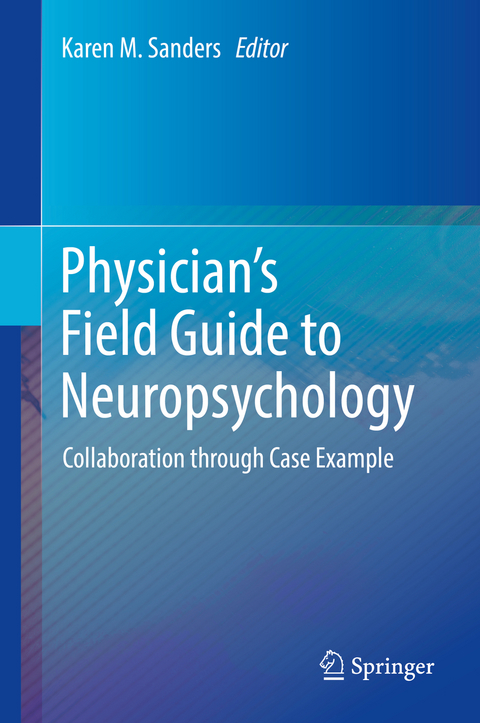
Physician's Field Guide to Neuropsychology
Springer-Verlag New York Inc.
978-1-4939-8720-7 (ISBN)
A sampling of the coverage:· The value of neuropsychological evaluation in medical practice.
· A model of collaboration between primary care and neuropsychology.
· Neuropsychological assessment of extremely preterm children.
· Alzheimer’s Disease and overview of dementia.
· Deep brain stimulation for Parkinson’s Disease.
· Neuropsychology in the 21st century: the rise of multicultural assessment.
· Neuropsychological interventions for individuals with brain injury.
The Physician’s Field Guide to Neuropsychology is both a rigorous and an accessible reference for clinicians in diverse disciplines including general practice, family medicine, neuropsychology, pediatrics, gerontology, and sports medicine.
Dr. Karen Sanders is a Board Certified Neuropsychologist through the American Board of Professional Psychology and member of the American Academy of Clinical Neuropsychology. She is a clinical assistant professor at the University of Washington School of Medicine, teaching medical residents about the use of neuropsychology She received her doctorate in psychology from Brigham Young University and a Bachelor of Music from the University of the Pacific Conservatory of Music. She completed two post-doctoral years of training at the University of Washington Medical Center and the Philadelphia Geriatric Center. Her clinical work includes the medical populations of neurology, movement disorder, CNS/non-CNS oncology, stroke, dementia and medical rehabilitation. Research participation includes neurocognitive outcomes in areas of oncology and cerebrovascular events. She is a Past - President of the Pacific Northwest Neuropsychological Society and member ofthe International Neuropsychological Society, National Academy of Neuropsychology and APA.
Introduction.- The Distinct Worlds of Neuropsychology and Medicine. -The world of the neuropsychologist: origins in norm-referenced testing.-The world of the medical practitioner: origins in Bayesian model.- Existing models of collaboration.- The difference between neuropsychological testing, cognitive screens, and neuroradiological exams.- The current debates in assessment: issues concerning evidenced-based testing, cognitive screens, computer-based cognitive tests, and standard neuropsychological testing.- Symptom validity in neuropsychological and medical settings.- Case Examples.- Pediatrics: Neuroimaging. - Pediatrics: Epilepsy. -Mild Cognitive Impairment vs. Alzheimer’s Disease. -Frontotemporal Dementia.- Vascular Dementia.- Middle Cerebral Artery Stroke.- Aneurysms: Ruptured and Unruptured. - Cardiovascular: Hypoxia. -Cardiovascular Surgery Outcomes. -Parkinson’s Disease.- Parkinson’s Plus Disorders.- Huntington’s Disease.- Lewy Body Dementia. -Traumatic Brain Injury: Sports Concussion. -Pediatric Brain Injury. -Cancer and Chemotherapy Outcomes.- Adult Epilepsy.- Multiple Sclerosis.- Psychiatric: Schizophrenia.- Neuroimaging and Biomarkers.- Surgery: Pre- and Post-Neurological Testing.-Related Issues in Collaboration: Specialties and Essential Considerations.- Multicultural Considerations. -Learning Disorders.- Forensic and Medicolegal Issues.- Medical Rehabilitation.-Vocational Issues. -Psychotherapy and Neuropsychotherapy.- Neuropsychological Feedback.-Family Needs and Involvement. –Appendix. -References.
“The purpose is to increase knowledge about the field of neuropsychology and provide physicians with information about the utility of neuropsychological assessment in collaborative medical care. … the book is aimed at physicians and residents in training.” (Christopher J Graver, Doody's Book Reviews, September 06, 2019)
| Erscheinungsdatum | 29.11.2018 |
|---|---|
| Zusatzinfo | 40 Illustrations, color; 4 Illustrations, black and white; XXVII, 612 p. 44 illus., 40 illus. in color. |
| Verlagsort | New York |
| Sprache | englisch |
| Maße | 155 x 235 mm |
| Themenwelt | Geisteswissenschaften ► Psychologie ► Biopsychologie / Neurowissenschaften |
| Medizin / Pharmazie ► Gesundheitswesen | |
| Medizin / Pharmazie ► Medizinische Fachgebiete ► Pädiatrie | |
| Schlagworte | medical and neuropsychological collaborative care • neurocognitive function • neuropsychological assessment • neuropsychological science • Standardized Assessment • utility of neuropsychology in medical settings |
| ISBN-10 | 1-4939-8720-8 / 1493987208 |
| ISBN-13 | 978-1-4939-8720-7 / 9781493987207 |
| Zustand | Neuware |
| Haben Sie eine Frage zum Produkt? |
aus dem Bereich


